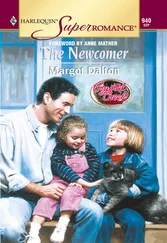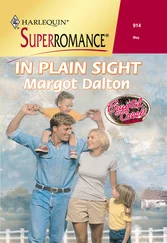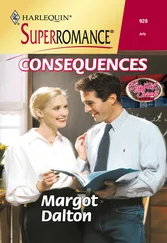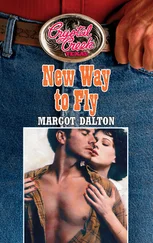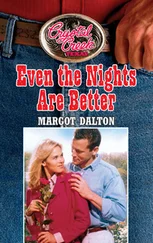Mary lowered her books onto the table and gave him a level stare. Then she sniffed dismissively and turned away. Gina smiled to herself.
“How was your choir practice, Mary?” she asked.
“It was exciting.” Mary crossed the kitchen and took a can of dog food from the cupboard. She opened it and measured the contents into a bowl with calm deliberation, while Annabel writhed on the hardwood floor in an agony of anticipation.
“Choir practice was exciting?” Roger asked.
Mary washed her hands at the sink and continued to address Gina as if he hadn’t spoken. “Mr. Bedlow gave the soprano solo to Marianna Turner.”
Gina’s eyes widened. “No kidding. Even though everybody knows?”
“What does everybody know?” Roger asked, watching with a bemused expression as Mary put Annabel’s bowl on the floor and the animal began to wolf it down as if she hadn’t eaten in weeks.
“About Mr. Bedlow and Marianna Turner,” Gina explained.
“What about them?”
“Oh, Roger,” Gina said. “How could you have possibly missed such a juicy tidbit of gossip?”
His look of surprise was almost comical. “Dried-up old Cecil Bedlow? And that plump young schoolteacher? There’s gossip about those two?”
Mary forgot she was no longer on speaking terms with the caretaker. “There certainly is,” she told him, tying on her apron, then began opening doors and cabinets, assembling the ingredients to prepare batter for the next morning’s fruit crepes.
“Was Marianna embarrassed?” Gina asked.
“I think so. Whatever’s happening, it’s more on his side than hers, in my opinion. I think poor Marianna just doesn’t know what to do about him.”
“You’re always so generous, Mary,” Roger said. “Other women would probably be catty about a situation like that.”
Mary ignored the compliment. “So we didn’t get much of anything else done,” she concluded, “except for the opening bars of the ‘Hallelujah Chorus.’ We’re singing it at the Canada Day picnic next weekend.”
“Well, of course,” Roger said solemnly. “That’s a rousing picnic song. Handel should blend right in with the fried chicken and the kids’ sack races.”
Mary gave him a stern glance. “Well, that’s good. Because your chamber-music group is booked to do four sets of Elizabethan madrigals on the entertainment stage by the hamburger tent.”
“Elizabethan madrigals!” he exclaimed, recoiling in alarm. “You’re joking.”
“It’s right there on the program, next to the Tiny Tots Highland Dancing.”
Roger subsided behind his coffee mug again. “This town is a mad, mad place,” he said sadly. “Utterly insane.”
“Oh, come on,” Gina said. She left the worktable to get herself a mug of coffee, pausing on the way to drop a kiss on the top of Roger’s shiny bald head. “You love living here. And you have lots of fun at the picnic every year, no matter how much you complain and make fun.”
“My goodness.” Mary paused with a sifter of flour in her hand. “I almost forgot,” she said, staring at Gina. “The choir practice wasn’t the only exciting thing this afternoon.”
Gina carried her mug back to her table and began construction of another yellow nymph. “So what else happened, Mary?”
“I got some library books.”
“How does the woman ever survive her days?” Roger asked with a grin. “Fraught as they are with such drama and excitement.” He rolled his eyes eloquently in Gina’s direction, making her giggle. Unruffled by his teasing, Mary began to mix the batter for her crepes in a big blue enamel bowl.
“I went to the library,” she repeated, “and picked out a lot of books for myself. I also got some new books on gardening and furniture restoration for you, Gina, in case you ever have time to read.”
“Thanks,” Gina told her. “That was thoughtful of you, Mary.”
“How about me?” Roger asked. “Did you get any books for me?”
“Two political biographies and a new mystery,” Mary replied calmly. “Although I probably needn’t have bothered, since you seem to be so busy these days.”
The words were innocent enough, but Gina was surprised by the unusual edge in Mary’s voice and the way Roger seemed to duck his head in embarrassment.
Suddenly the room was full of tense undercurrents. Confused, Gina looked from one to the other, about to ask what was going on, when Mary resumed her story.
“And while I was browsing through the newspapers, I discovered the most amazing thing.”
“An appropriate location to make amazing discoveries,” Roger murmured, his equilibrium apparently restored. “Among the well-stocked shelves of the Azure Bay Library.”
Mary ignored him and addressed Gina. “Remember the day you brought that man into the kitchen and introduced him to me? The one who’s staying all summer with his daughter?”
Gina nodded. “Alex Colton. He’s arriving in a few days.”
“And remember how I told you after he left…” Mary paused to add more milk to her batter. “I told you I was absolutely positive I’d seen him somewhere, and you said I was probably wrong because he’d never been in the valley before?”
Gina nodded, baffled. “I remember. Why?”
“Well, I was right,” Mary said, crossing the kitchen to rummage through the pile of books and magazines.
Gina got up again and crossed to the big central table, cradling her coffee mug in her hands and sitting down next to Roger.
Mary opened a recent copy of a newspaper and laid it out on the table in front of them. “See?” She stood back with an air of triumph.
Gina gazed in astonishment. Alex Colton’s picture appeared at the top of a newspaper column on the financial pages. She studied the image, struck once again by the man’s appealing masculine look, and the contradictory mixture of sensuality and asceticism in his face.
“I’ll be damned!” Roger exclaimed. “Alex Colton is a columnist? I thought he was a college professor.”
“Not just any columnist. He’s Alexander Waring.” The usually reserved Mary clearly enjoyed the sensation she was causing. “He writes this column about investment and personal finance,” she told Gina. “It’s syndicated, and Roger and I read it all the time. His column’s in a lot of the big papers, but it never used to have his picture at the top. He also has four or five books in the library.”
Roger leaned closer to examine the paper. “Well, I’ll be damned,” he repeated. “Alexander Waring. I have two of his books at home, you know. He has terrific money sense.” Roger shook his head in amazement. “And to think I talked with the man about woodwork and cello music, and didn’t even know who he was.”
“Well, I don’t know as much about the world of high finance as you two obviously do.” Gina took the paper from Roger and studied the picture. “Is he really good?”
“He’s one of the best,” Roger said. “His books give down-to-earth advice on investing and money management, things an ordinary person can actually use. And sometimes,” he added with a smile, “they’re really funny. The man must have a great sense of humor.”
“Can I borrow one of them?” Gina asked. “It’s probably…it’s time for me to start learning something about money management,” she said lamely when the other two looked at her in surprise.
Roger’s eyes were bright with teasing. “That’s all you want to learn?”
“Of course,” Gina said. “You know, I just remembered—he did say that he planned to do some writing this summer. He asked me about electrical outlets on the gold-room balcony for his computer.”
“I suppose he has to keep writing even during the holidays,” Mary said. “He could hardly take two whole months off, after all. A lot of people swear by that column of his.”
Читать дальше




